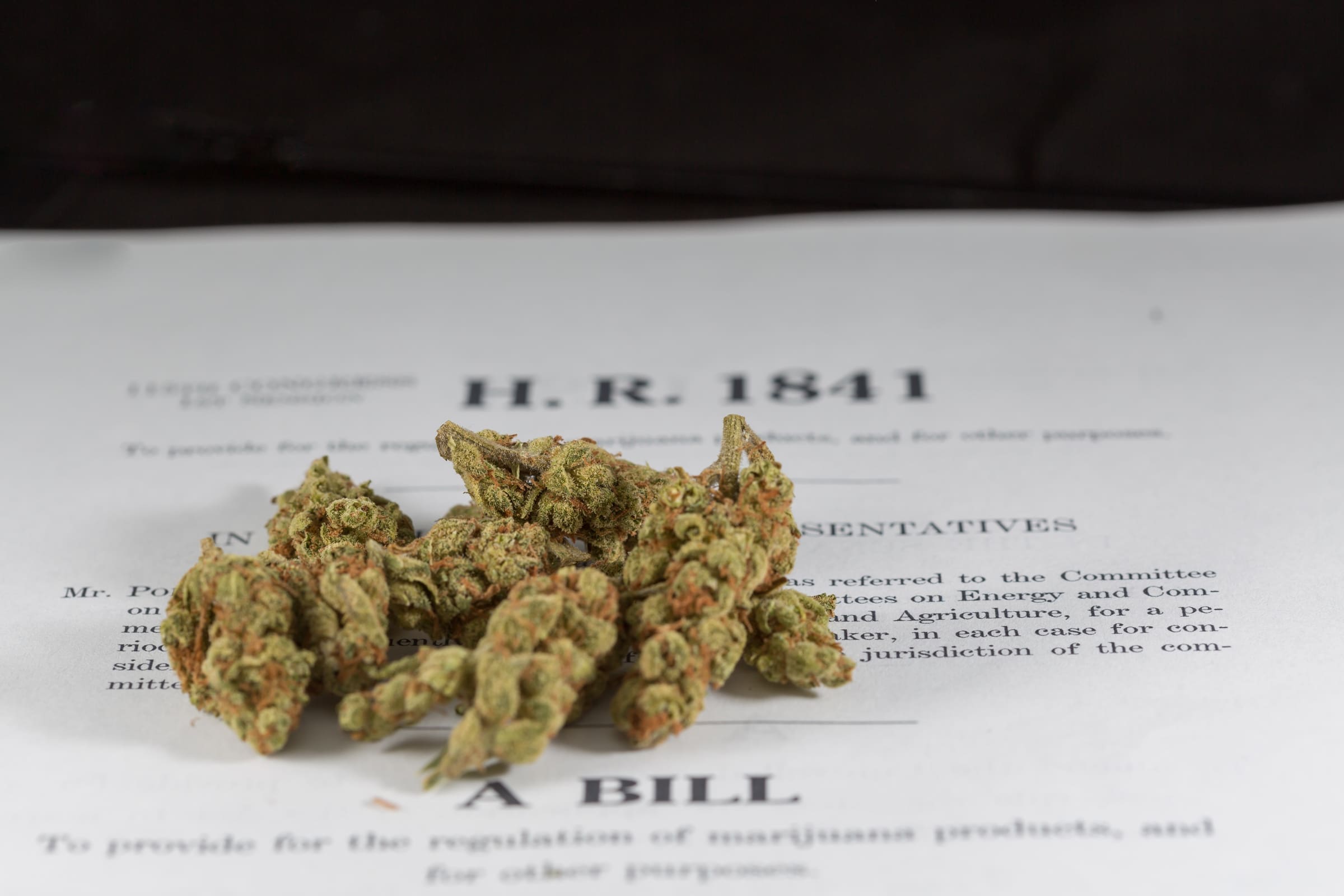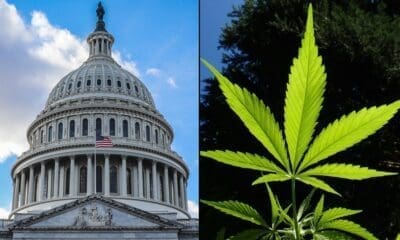Politics
Analysis: GOP Congress Has Blocked Dozens Of Marijuana Amendments

Increase military veterans’ access to access medical cannabis. Shield state marijuana laws from federal interference. Protect industrial hemp growers’ water rights. Allow marijuana businesses to be taxed fairly and to access banking services.
That describes just some of the nearly three dozen cannabis-related amendments that Republican leadership in the U.S. House of Representatives has blocked from even being voted on during the current Congress, a new analysis by Marijuana Moment finds.
On at least 34 occasions, lawmakers—Democrats and Republicans alike—filed marijuana and drug policy reform proposals only to be stymied by the powerful Rules Committee, which decides which measures can advance to the House floor.
One Man Is The Biggest Obstacle To Congressional Marijuana Reform.
That panel, led by Congressman Pete Sessions (R-TX), has for the past several years instituted an effective roadblock to cannabis law reform by refusing to make any amendments dealing with the plant “in order.” That means the full 435-member roster of House never even gets an opportunity to vote on the measures.
This Man Is The Reason Congress Can’t Vote On Marijuana Anymore
This analysis only covers the current 115th Congress, which began in January 2017. Republican leaders have made a practice of blocking cannabis amendments since the previous summer.
The last time the House was allowed to vote on marijuana, in May 2016, a measure to allow military veterans to get medical cannabis recommendations from Department of Veterans Affairs doctors was approved by a overwhelming vote of 233 to 189. Several other marijuana measures were approved on the House floor in the two years preceding that, including proposals to let marijuana businesses store their profits in banks and to protect state medical cannabis laws from Justice Department interference, the latter of which made it into federal law and is still on the books.
In June 2015, an amendment to expand that protection to prevent the Department of Justice from interfering with all state marijuana laws—including those allowing recreational marijuana use and sales—came just nine flipped votes short of passage.
Since that time, the number of states with legal marijuana has more than doubled, meaning that far more legislators now represent constituents who would stand to be protected. Advocates are confident they could get the measure approved if given another opportunity, but the cannabis blockade by Sessions’s Rules Committee has meant that no more votes on it have been allowed.
While House Republicans have instituted a broader policy of blocking amendments deemed to be “controversial” after floor disputes on gay rights and gun policy measures threatened the passage of several spending bills in 2015, Sessions, who is not related to U.S. Attorney General Jeff Sessions, seems to have a particular problem with marijuana.
“I, as probably everybody in this rooms knows, have a strong opinion on drugs, illegal drugs, alcohol,” he said just before stymying a measure to prevent federal intervention in state cannabis laws earlier this year. “Marijuana is an addictive product, and the merchants of addiction make it that way. They make it for addiction. They make it to where our people, our young people, become addicted to marijuana and keep going.”
On another occasion, Sessions claimed that cannabis is now more potent than it was when he was a young man—by a mathematically impossible factor.
“When I went to high school…in 1973, I graduated, marijuana, on average, is 300 times more powerful,” he said. “That becomes an addictive element for a child to then go to the next thing.”
Legalization Supporters Target Sessions For Defeat.
Sessions, like all members of the House, is up for reelection this year. The Cook Political Report, which tracks congressional races, moved his seat—Texas’s 32nd congressional district—from being rated “Lean Republican” to the closer “Toss Up” status last month. In 2016, Hillary Clinton won the district.
Sensing an opportunity, marijuana reform advocates are targeting Sessions for defeat in 2018.
Pro-legalization Congressman Earl Blumenauer (D-OR), who has authored several of the blocked amendments, started a PAC and pledged to fund in-district billboards spotlighting Sessions’s anti-cannabis tactics.

Six of the amendments blocked by Sessions and his committee concerned military veterans’ access to medical cannabis. Five had to do with marijuana businesses’ ability to use banking services. Seven would have allowed states and Washington, D.C. to implement their own marijuana laws without federal interference.
“These are not controversial measures. They have bipartisan support,” Blumenauer told Marijuana Moment in an emailed statement. “By blocking our amendments, Sessions is standing in the way of progress, commonsense, and the will of the American people—and that includes Republican voters.”
Pro-Legalization Congressman To Target Anti-Cannabis Lawmakers
Sessions faces Democrat Colin Allred, a former NFL player, in November.
“I support the use of medical marijuana as an alternative to the habit-forming opioids that have become a national crisis,” the challenger told Politico. “This common-sense approach to alternative treatments has been opposed by Pete Sessions, and is something I will fight to expand.”
It is unfortunate that Pete Sessions refuses to acknowledge that medical marijuana can help our veterans coming back from war who are struggling with PTSD and chronic pain. https://t.co/NxpfE55Xzr
— Colin Allred (@ColinAllredTX) June 7, 2018
The willingness to see Sessions go extends even to dedicated Republicans who could risk seeing control of the House tipped to Democrats in what is expected to be a very close midterm election overall.
“More often than not, elected officials respond to carrots and sticks. So if making Pete Sessions an electoral casualty is what it takes to advance drug policy reform, so be it,” Don Murphy, a Republican former Maryland state lawmaker who now serves as federal policies director for the Marijuana Policy Project (MPP), told Marijuana Moment. “If the GOP loses control of the House by one vote, it won’t be my fault. I tried to warn them.”
Former MPP executive director Rob Kampia says he’s aiming to raise half a million dollars to pour into the effort to defeat Sessions with his new outfit, the Marijuana Leadership Campaign, and a related political action committee.
More Cannabis Amendments Are Likely To Be Blocked Soon.
In the meantime, it seems likely that even more cannabis proposals will be added to the blocked tally when the Rules Committee considers a broad funding package this week which includes the Financial Services and General Government bill. Earlier versions of that annual appropriations legislation have been used as vehicles for measures concerning Washington, D.C.’s ability to spend its own money regulating marijuana and to allow cannabis growers, processors and retailers to access financial services.
Marijuana Moment’s analysis of blocked marijuana amendments relies heavily on a report issued in late May by Rules Committee Democrats, which tallied all blocked amendments across issues up to that point. (Marijuana Moment identified several subsequent cannabis measures that were prevented from reaching the floor following the Democratic report’s release.)
“Shutting down amendments and preventing debate is bad for the Congress as an institution, but is even worse for the country,” the Rules Committee minority, led by Congressman James McGovern of Massachusetts, wrote. “The inevitable result is partisan legislation written by a small number of Members, staff and lobbyists, with many bipartisan priorities left out in the cold.”
“Blocking amendments shuts out members of Congress from offering their ideas to improve legislation, and in doing so silences the voices of the millions of Americans they are elected to represent. So far during this record-breaking closed 115th Congress, 380 Members have had at least one amendment blocked from consideration by the Republican-controlled Rules Committee and Republican Leadership.
“These districts account for 270 million Americans. In other words, Representatives from roughly 80 percent of the county have been blocked from offering an idea for debate on the House Floor – the ideas their constituents sent them to Congress to advocate for on their behalf.”
In the report, which dubs the 115th Congress “the most closed Congress in history,” Democrats call out Speaker Paul Ryan (R-WI), who pledged to “uphold the rights of the minority” and “have a process that is more open, more inclusive, more deliberative, more participatory.”
“You are the first Speaker in history to have never allowed a truly open rule, which would permit all Members to offer their ideas on the floor of the House,” McGovern and Democratic colleagues wrote.
“The People’s House is meant to operate as a deliberative body. Shutting out the voices of the representatives of hundreds of millions of Americans erodes the foundation of our democracy, and makes the job of governing increasingly more difficult.”
While the Democrats highlight several issue areas such as guns, immigration, the environment, veterans affairs and criminal justice reform in their report narrative, they do not specially discuss the blocked marijuana amendments, which are included in an appendix that lists every submitted measure not “made in order” by the Rules Committee.
Among the cannabis-related amendments impeded during this Congress were measures to reduce funding for the Drug Enforcement Administration’s marijuana eradication efforts, shield military veterans from losing their benefits due to cannabis use, expand research on marijuana’s medical benefits, allow Indian tribes to enter the cannabis industry and create a federal excise tax on marijuana sales.
There were also measures that would have granted an official congressional apology for the damage done by the war on drugs and ceased the practice of punishing states that don’t automatically revoke drivers licenses from people convicted of drug offenses.
At a time when marijuana law reform enjoys overwhelming support from voters, and more states are modernizing their cannabis laws, lawmakers in the so-called “People’s House” are not even allowed to vote on the issue.
The Senate Saves The Day. Maybe.
For the past several years, cannabis reform advocates have been largely relying on the Senate to advance their proposals. Last month, for example, that chamber’s Appropriations Committee approved measures on veterans’ medical cannabis access and preventing Justice Department intervention in state medical marijuana laws. (The panel, however, blocked an amendment on banking for marijuana businesses.)
Meanwhile, advocates this year for the first time advanced a marijuana amendment out the House Appropriations Committee, circumventing the Pete Sessions floor blockade. That measure, to shield state medical cannabis laws from federal interference, has historically required House floor votes—now impossible, thanks to Sessions—or Senate action to advance.
The ultimate fate of the various Senate-approved marijuana measures now rests with bicameral conference committees that will merge the two chambers’ bills into single proposals to be sent to President Trump’s desk.
For example, both the Senate and the House approved separate versions of large-scale food and agriculture legislation known as the Farm Bill this year, but only the Senate version has hemp legalization language in it. Sessions’s Rules Committee blocked a House vote. It will be up to the conference committee to decide which version prevails.
Regardless of which party controls the chamber when the 116th Congress is seated in January, Ryan, who is retiring, will be gone. And if legalization supporters have their way, so will Sessions.
See below for the full list of cannabis amendment blocked by Pete Sessions and the Rules Committee during the 115th Congress:
| Amendment Summary | Sponsor(s) |
| Prohibits the use of funds to prevent any of various states from implementing their own laws that authorize the use, distribution, possessions, or cultivation of marijuana on non-Federal lands within their respective jurisdictions. | Polis (CO), McClintock (CA) |
| Specifies that cannabis-related businesses may utilize federal financial institutions when they are compliant with the law or regulation of their state or political subdivision of their state. | Gaetz (FL), Rohrabacher (CA) |
| Permits the District of Columbia to spend its local funds to regulate and tax recreational marijuana. | Norton (DC), Rohrabacher (CA), Blumenauer (OR), Lee, Barbara (CA) |
| Prohibits funds from being used to limit or interfere with the ability of VA healthcare providers to make appropriate recommendations, fill out forms or take steps to comply with a medicinal marijuana program approved by a state. | Blumenauer (OR), Amash (MI), Curbelo (FL), Gaetz (FL), Garrett (VA), McClintock (CA), Reed (NY), Rohrabacher (CA), Cohen (TN), Young, Don (AK), Lee, Barbara (CA), Perlmutter (CO), Polis (CO), Titus (NV), Hunter (CA), Pocan (WI), DeFazio (OR), Correa (CA) |
| Prohibits funds from being used to limit or interfere with the ability of VA healthcare providers to make appropriate recommendations, fill out forms or take steps to comply with a medicinal marijuana program approved by a state. | Blumenauer (OR), Amash (MI), Curbelo (FL), Gaetz (FL), Garrett (VA), McClintock (CA), Reed (NY), Rohrabacher (CA), Young, Don (AK), Cohen (TN), Correa (CA), Lee, Barbara (CA), Perlmutter (CO), Polis (CO), Titus (NV), Hunter (CA), Pocan (WI), DeFazio (OR) |
| Prevents the denial of water rights to a legal owner of an absolute or conditional water right, or an entity that receives or distributes water contracted from the Federal government for the cultivation of industrial hemp. | Polis (CO), Comer (KY) |
| Prevents the denial of water rights to a legal owner of an absolute or conditional water right, or an entity that receives or distributes water contracted from the Federal government for the cultivation of industrial hemp. | Polis (CO) |
| Prevents denial of federal water rights to hemp and marijuana farmers and growers. | Polis (CO), Blumenauer (OR), Young, Don (AK), Bonamici (OR) |
| Prohibits the Department of Justice from prosecuting individuals who are in compliance with their state’s medical marijuana laws, or otherwise interfering with the implementation of such laws. | Rohrabacher (CA), Blumenauer (OR), Young, Don (AK), Polis (CO), McClintock (CA), Lee, Barbara (CA), Joyce (OH), Cohen (TN), Gaetz (FL), Titus (NV), Coffman (CO), Lewis, Jason (MN), Rosen (NV), Correa (CA) |
| Prevents funds to the Department of Justice from being used in preventing or delaying the applications of research of schedule I controlled substances for conducting medical research in states and jurisdictions that said substance is legal for medicinal use pursuant to State law | Gaetz (FL) |
| Prohibits funds from being used to pay the salaries or expenses of personnel to fail to act on a marijuana research application. | Polis (CO) |
| Prohibits any funds from being used to prevent a state from implementing any law that makes it lawful to possess, distribute, or use cannabidiol or cannabidiol oil. | Perry (PA) |
| Reduces funds in the DEA Salaries and Expenses used for the Domestic Cannabis Eradication/Marijuana Suppression Program. Increases the spending reduction account by the same amount. | Lieu (CA), Polis (CO), Young, Don (AK), Titus (NV) |
| Provides that none of the funds made available in this Act to the Department of Justice may be used, with respect to any of the States of Alabama, Alaska, Arizona, Arkansas, California, Colorado, Connecticut, Delaware, Florida, Georgia, Hawaii, Illinois, Indiana, Iowa, Kentucky, Louisiana, Maine, Maryland, Massachusetts, Michigan, Minnesota, Mississippi, Missouri, Montana, Nevada, New Hampshire, New Jersey, New Mexico, New York, North Carolina, North Dakota, Ohio, Oklahoma, Oregon, Pennsylvania, Rhode Island, South Carolina, Tennessee, Texas, Utah, Vermont, Virginia, Washington, West Virginia, Wisconsin, and Wyoming, to prevent any of them from implementing their own laws that authorize the use, distribution, possession, or cultivation of marijuana on non-Federal lands within their respective jurisdictions. | McClintock (CA), Polis (CO), Blumenauer (OR), Amash (MI), Coffman (CO), Cohen (TN), Curbelo (FL), Heck, Denny (WA), Lee, Barbara (CA), Perlmutter (CO), Pocan (WI), Sanford (SC), Rohrabacher (CA), Young, Don (AK), Hunter (CA), Smith, Adam (WA |
| Prohibits any DOJ funds from being used to prevent a state from implementing its own state laws that authorize the use, distribution, possession, or cultivation of industrial hemp | Bonamici (OR), Polis (CO), Blumenauer (OR), Soto (FL), Comer (KY), Pocan (WI) |
| Prohibits the Department of Justice from prosecuting individuals from federally recognized Indian tribes who are in compliance with their tribal medical marijuana laws, or otherwise interfering with the implementation of such laws | Titus (NV), Polis (CO), Blumenauer (OR) |
| Permits the District of Columbia to spend its local funds to regulate and tax recreational marijuana. | Norton (DC), DeSaulnier (CA), Blumenauer (OR) |
| Blocks FinCEN from revoking guidance on how financial institutions should provide banking services to legitimate marijuana businesses. | Heck, Denny (WA), Young, Don (AK), Perlmutter (CO), Lee, Barbara (CA), Titus (NV) |
| Prohibits funds from being used to penalize a financial institution for serving a legitimate marijuana business. | Heck, Denny (WA), Young, Don (AK), Perlmutter (CO), Gaetz (FL), Lee, Barbara (CA), Titus (NV), Rosen (NV), McClintock (CA), Blumenauer (OR), Correa (CA) |
| Blocks FinCEN from altering guidance on how financial institutions should provide banking services to legitimate marijuana businesses. | Heck, Denny (WA), Young, Don (AK), Perlmutter (CO), Lee, Barbara (CA), Titus (NV), Collins, Chris (NY), King, Peter (NY) |
| Eliminates Section 159 of title 23, which reduces highway funding for states if they did not automatically suspend drivers licenses of anyone convicted of a drug offense. | O’Rourke (TX), Amash (MI), Jeffries (NY), Nadler (NY) |
| Exempts Cannabis businesses from 280e of the federal tax code | Polis (CO) |
| Applies a 15 percent excise tax on marijuana sales for the purposes of deficit reduction | Correa (CA) |
| Prevents the Drug Enforcement Administration (DEA) from prosecuting anyone for using, selling, or possessing marijuana in compliance with state laws, thus protecting the legal marijuana industry across the country from Federal interference. | Polis (CO) |
| Allows small businesses located in states that have legalized marijuana to utilize tax deductions | Polis (CO) |
| Creates a safe harbor for financial institutions that provide services to hemp legitimate businesses authorized under the pilot program in the 2014 Farm Bill and affiliated third parties. | Barr (KY) |
| Amends the Controlled Substances Act to exclude industrial hemp from the definition of “marijuana.” | Massie (KY), Polis (CO) |
| Removes industrial hemp from the definition of marihuana under the Controlled Substances Act and places it under the jurisdiction of the USDA as an agricultural commodity. | Comer (KY), Blumenauer (OR), Polis (CO), Barr (KY), Taylor (VA), Bonamici (OR) |
| Requires the VA to study medicinal marijuana as an alternative treatment option to prescription opioids. | Polis (CO), Correa (CA) |
| Forbids the VA from discriminating against veterans who use cannabis consistent with the laws of their state. | Crist (FL), Blumenauer (OR) |
| Prevents denial of federal water rights to hemp and marijuana farmers and growers. | Polis (CO), Blumenauer (OR), Bonamici (OR), Young, Don (AK) |
| Prohibits funds from being used by the Department of Veterans Affairs to deny VHA benefits to veterans, their dependents, and their survivors if they use marijuana in compliance with state law. | Blumenauer (OR), Correa (CA) |
| Prohibits funds from being used to limit or interfere with the ability of VA healthcare providers to make appropriate recommendations, fill out forms, or take steps to comply with a medicinal marijuana program approved by a state. | Blumenauer (OR), Amash (MI), Lee, Barbara (CA), Curbelo (FL), Crowley (NY), Gaetz (FL), Titus (NV), Jones (NC), Cohen (TN), McClintock (CA), Correa (CA), Reed (NY), Perlmutter (CO), Rohrabacher (CA), Pocan (WI), Young, Don (AK), DeFazio (OR), Sanford (SC) |
| Provides congressional apology for its role regarding the War on Drugs. | Watson Coleman (NJ) |
















